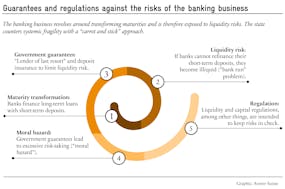Mediaplanet: Jakob Schaad, Avenir Suisse shows in a new study that digitization in Switzerland is less revolution than steady evolution. Does that mean people are less aware of the changes?
Jakob Schaad: Possibly. Switzerland has always been able to adapt to new technologies. Today we see that the skill requirements in the labor market are slowly but surely increasing as a result of these changes. So far, our education system has mastered the challenges, and many people are undergoing further training. However, in times of technological uncertainty, it is clear that general education gains in value over specialist knowledge. Specialist knowledge always carries the risk of suddenly becoming worthless. So we cannot rest. One important educational goal should be digital thinking. Elementary schools in particular need to catch up, and in some cases the vocational training system too.
Looking into your crystal ball, what changes are coming to the Swiss Fintech industry?
A whole lot, I would say! Switzerland is hardly a frontrunner. For example, in asset management, we still make little use of digitization. That’s despite the fact that many things, such as optimal risk diversification in a securities portfolio, are very technical.
Algorithms can do better than human consultants. Roboadvisory could also be used more widely. Artificial intelligence might also be utilized to tailor investment recommendations to client needs. Last but not least, there is the possibility of combining digital tools with conventional consulting. And we should look at RegTech (Regulatory Technology), since the financial industry is highly regulated worldwide. RegTech services can help to implement new regulations more efficiently, for example in monitoring key figures such as equity and liquidity. Singapore and the UK already have strategies in place.

Switzerland has always been able to adapt to new technologies. (Fotolia)
Is the support provided to young entrepreneurs in these new business fields sufficient?
We are cautious when it comes to recommending special conditions, such as subsidies or tax breaks. The general framework is much more important. First, the state should not impede start-ups, for example in terms of taxation or cumbersome regulation.
Working hours have increased lately ‒ will the boundaries between private and professional life continue to blur?
We’ve studied the gig economy. In this part of the labor market, small contracts and project work are often awarded to freelancers at short notice. In terms of numbers, they are not yet strong in Switzerland. However, the gig economy is likely to grow. Being employable in different areas is an eminent advantage in the new working world. For this reason, some adjustments in the social security system are necessary. The traditional sharp distinction between employed and self-employed may not be sufficient in future. Avenir Suisse has proposed the creation of a new social security status of “self-employed employees.” The Federal Council is currently examining the idea.





